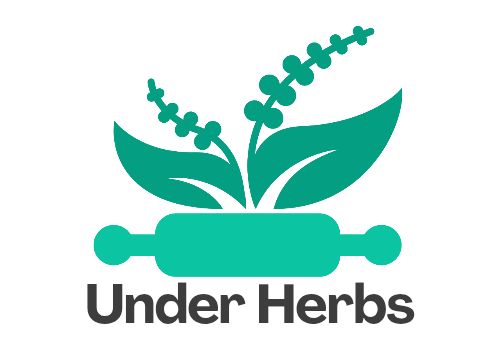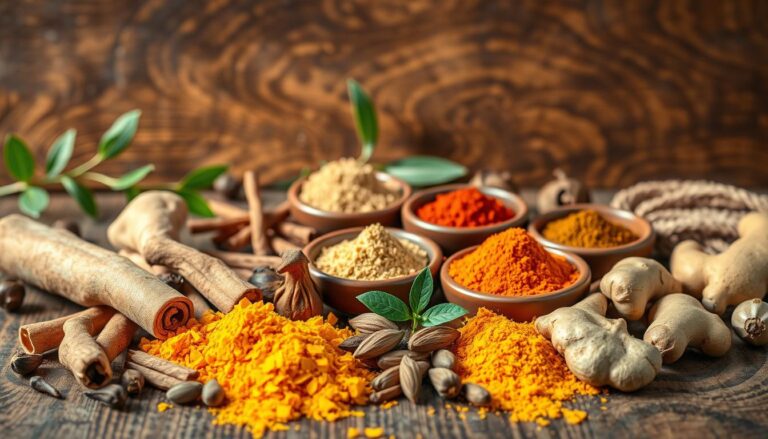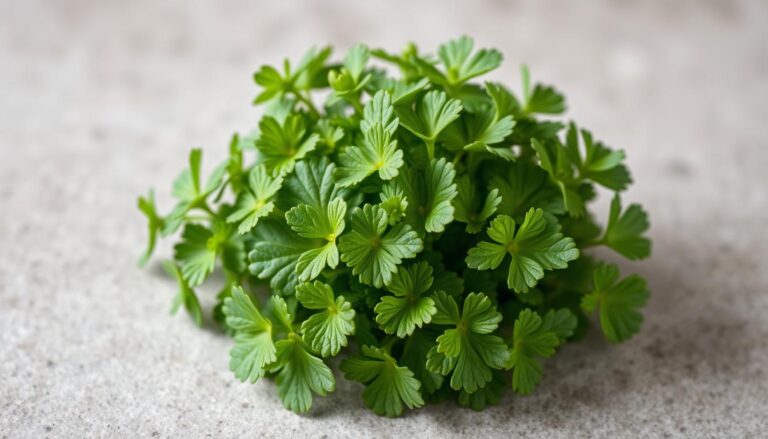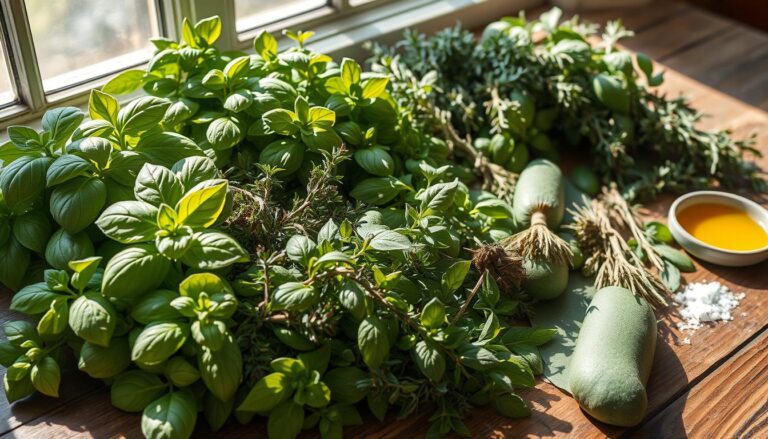Effective Herbal Treatments for Acid Reflux
Acid reflux affects millions and can be managed. Natural remedies are getting attention for their benefits.
Studies show that herbal supplements like peppermint oil and licorice root might help. They could improve symptoms when used with other treatments. But, we need more research to know for sure.
Looking into natural treatments gives hope for those wanting different options. As we explore herbal treatments, it’s key to look at the evidence and possible benefits.
Key Takeaways
- Natural remedies may help alleviate acid reflux symptoms.
- Herbal supplements like peppermint oil and licorice root show promise.
- Further research is necessary to understand their effectiveness.
- Combining natural remedies with other treatments may improve symptoms.
- Exploring alternative solutions can benefit those with acid reflux.
Understanding Acid Reflux and Its Impact on Health
For those who deal with acid reflux, it’s important to know what it is. Acid reflux, or gastroesophageal reflux disease (GERD), happens when stomach acid flows back into the esophagus. This can irritate the esophagus lining, causing pain.
Common Symptoms and Their Effects on Daily Life
Symptoms of acid reflux can be really tough to handle. They include heartburn, chest pain, trouble swallowing, and food coming back up. These issues can mess up your sleep, eating, and overall happiness.
Dr. John Smith, a gastroenterologist, says, “Acid reflux can really affect your daily life. It’s important to find ways to manage it.”
Root Causes of Acid Reflux
Many things can lead to acid reflux. These include being overweight, being pregnant, smoking, and certain foods or meds. Knowing what causes it helps in managing it better.
For example, staying at a healthy weight and avoiding certain foods can help. A study in the Journal of Clinical Gastroenterology found, “Changing your lifestyle is often the first step against acid reflux.”
Limitations of Conventional Treatments
Antacids and PPIs can help, but they’re not for everyone. They might have side effects or not work well with other meds. This shows we need other ways to treat acid reflux.
Looking into herbal supplements for acid reflux relief can be a good option. They offer more ways to manage the condition.
Powerful Herbal Remedies for Acid Reflux Relief
Herbal remedies are a promising option for acid reflux relief. For centuries, herbs have helped with digestive issues like acid reflux. They target the root causes of acid reflux, offering a holistic approach.
How Herbs Target Acid Reflux Differently Than Medications
Herbs address the main causes of acid reflux, such as inflammation and poor digestion. Some herbs have anti-inflammatory properties that soothe the digestive tract. Others help with digestion or protect the esophageal lining.
Key differences between herbal remedies and conventional medications include:
- Holistic approach: Herbs often target multiple aspects of acid reflux simultaneously.
- Fewer side effects: Generally, herbs have a lower risk of adverse effects compared to pharmaceuticals.
- Long-term relief: Some herbs may offer sustained relief by improving overall digestive health.
Scientific Evidence Supporting Herbal Approaches
Research shows promising results for herbal remedies in managing acid reflux. For example, a study on ginger found it significantly reduced acid reflux symptoms in patients.
“Ginger has been shown to possess anti-inflammatory properties that can help alleviate symptoms of acid reflux.”
| Herb | Potential Benefits | Form |
|---|---|---|
| Ginger | Anti-inflammatory, digestive aid | Tea, capsules, fresh root |
| Chamomile | Soothes digestive tract, reduces inflammation | Tea, capsules |
| Licorice Root | Protects esophageal lining, anti-inflammatory | DGL (Deglycyrrhizinated Licorice) capsules, tea |
Safety Considerations When Using Natural Remedies
Herbal remedies are generally safe, but use them wisely. Consider potential interactions with medications, allergic reactions, and the quality of the product.
Precautions include:
- Consulting with a healthcare provider before starting any new supplement.
- Ensuring the quality and purity of the herbal product.
- Monitoring for any adverse effects or interactions.
Ginger: Nature’s Anti-Inflammatory Agent
Ginger is a natural remedy for acid reflux. It has been used for years because of its anti-inflammatory and anti-oxidative properties. A 2023 review found that ginger can help with acid reflux and GERD.
Calming the Digestive System
Ginger’s anti-inflammatory properties help calm the digestive system. It reduces inflammation in the esophagus and stomach lining. This helps ease acid reflux symptoms.
Key Benefits of Ginger:
- Reduces inflammation in the digestive tract
- Aids in digestion and reduces symptoms of nausea
- May help in reducing the frequency of acid reflux episodes
Preparation Methods
Ginger can be used in different ways. Here are some common methods:
| Preparation Method | Description | Benefits |
|---|---|---|
| Ginger Tea | Steep fresh ginger in hot water | Soothes the digestive system, easy to prepare |
| Capsules | Ginger extract in capsule form | Convenient, precise dosage |
| Fresh Root | Consume raw ginger | High in active compounds, versatile in recipes |
A healthcare professional said, “Ginger has been a staple in many traditional medicines. Its effectiveness in treating digestive issues is well-documented.”
“Ginger has a long history of use in various cultures for its medicinal properties, particularly for digestive complaints.”
Recommended Dosage and Potential Side Effects
Ginger is generally safe, but knowing the right dosage and potential side effects is important. The recommended dosage is 250 mg to 500 mg per day. But, high doses can upset the stomach in some people.

To get the most out of ginger and avoid risks, talk to a healthcare provider. This is especially true for people with health conditions or those taking medications.
Chamomile: The Gentle Esophageal Soother
Chamomile is a natural relaxant that can soothe the esophagus. It helps reduce acid reflux symptoms. Chamomile tea is especially good for calming the digestive system.
Reducing Stomach Acid
Studies show that chamomile can lessen GERD symptoms and inflammation. It has anti-inflammatory properties. These can help ease the irritation from stomach acid.
Best Consumption Methods
Chamomile can be enjoyed as a tea or in capsule form. The best method depends on what you like and how bad your symptoms are.
| Consumption Method | Benefits | Precautions |
|---|---|---|
| Tea | Soothing, easy to digest | May not be suitable for those with severe tea-induced allergies |
| Capsules | Concentrated dose, convenient | Potential interactions with other medications |
Who Should Exercise Caution
Chamomile is usually safe, but those allergic to daisy family plants should be careful. Pregnant women and people with certain health issues should talk to a doctor before using it.
Knowing the benefits and cautions of chamomile helps you decide if it’s right for managing acid reflux.
Licorice Root: Traditional Protection for the Stomach Lining
Licorice root, especially the deglycyrrhizinated form (DGL), is getting more attention for acid reflux relief. For centuries, it has been used to soothe and protect the stomach lining in traditional medicine.

Understanding DGL (Deglycyrrhizinated Licorice)
DGL is a processed licorice root that removes most of its glycyrrhizin. This makes it safer for long-term use. It allows people to enjoy licorice root’s benefits without risks. DGL stimulates the mucous cells in the stomach lining, helping to protect against acid and irritants.
How Licorice Creates a Protective Barrier
Licorice root, especially DGL, offers relief from acid reflux in several ways. It enhances the stomach lining’s protective barrier and soothes irritated tissues. This reduces inflammation and promotes healing. It’s key for acid reflux sufferers, as it prevents further irritation and damage.
Proper Usage Guidelines and Contraindications
It’s important to follow the right usage guidelines when using licorice root or DGL for acid reflux. DGL is usually found in chewable tablets or capsules. The recommended dose is 250 to 500 mg before meals, based on studies. But, people with high blood pressure or heart disease should talk to a doctor first. This is because licorice root may interact with some medications or worsen certain conditions.
By knowing how to use licorice root, especially DGL, people can use it as a natural herbal supplement for acid reflux relief. It helps promote a healthier digestive system.
Slippery Elm and Marshmallow Root: The Mucilage Healers
Slippery elm and marshmallow root are known for their ability to protect irritated tissues. They have been used for centuries to ease digestive problems, including acid reflux.
Protective Effects on Irritated Tissues
These herbs are full of mucilages, which turn gel-like when mixed with water. This helps them form a protective barrier on the stomach and esophagus. This barrier shields them from acid and reduces inflammation.
Herbal experts say these herbs can give quick relief from heartburn and irritation in the esophagus.
Various Forms and Application Methods
Slippery elm and marshmallow root come in teas, capsules, and tinctures. You can take them alone or mix them for better results. For example, a soothing tea made from both can calm the digestive system.
Combining for Enhanced Benefits
Together, slippery elm and marshmallow root offer synergistic benefits. They work better together to treat acid reflux. This duo soothes the esophagus and protects the stomach lining.
Using slippery elm and marshmallow root can help manage heartburn naturally. They are a great option for those looking for natural ways to treat acid reflux.
Adding these herbs to your routine can help with heartburn relief. It promotes long-term health of your digestive system.
Lesser-Known Herbal Remedies for Acid Reflux
Looking for a natural way to handle acid reflux? There are herbal remedies that might help. These natural options can be used alone or with other treatments to ease acid reflux symptoms.
Meadowsweet: The Natural Salicylic Acid Source
Meadowsweet is known for its anti-inflammatory effects, thanks to salicylic acid. This herb may help in reducing inflammation in the digestive tract, easing acid reflux symptoms. It’s a natural choice instead of synthetic salicylates.
Fennel Seeds: Digestive Relaxants
Fennel seeds have been used for ages to ease digestion and reduce bloating. The carminative properties of fennel seeds can relax the digestive system. This might help cut down on acid reflux.
Angelica Root: Traditional Chinese Approach
In Traditional Chinese Medicine, angelica root is prized for its digestive benefits. It’s thought to help balance the digestive system and ease acid reflux symptoms. It does this by improving digestion and reducing inflammation.
These herbal remedies are a good alternative treatment for acid reflux. They focus on natural healing and might have fewer side effects than regular meds. Always talk to a healthcare professional before trying any new herbal remedy.

Creating a Comprehensive Herbal Treatment Plan
Managing acid reflux symptoms well needs a careful herbal treatment plan. It’s not just about picking the right herbs. You also need to make diet changes, time your herbal intake right, and watch your symptoms. This way, you can tweak the treatment as needed.
Dietary Adjustments to Enhance Herbal Effectiveness
Making diet changes is key to making herbal remedies work better for acid reflux. Avoiding trigger foods like citrus fruits, tomatoes, and spicy foods can lessen symptoms. Adding foods rich in alkaline, like veggies and whole grains, can also help balance stomach acid.
- Eat smaller, more frequent meals to reduce pressure on the lower esophageal sphincter.
- Choose low-fat foods to speed gastric emptying.
- Avoid lying down after eating.
Timing and Frequency of Herbal Remedies
When and how often you take herbal remedies matters a lot. For example, taking ginger before meals can stop acid reflux symptoms. Taking slippery elm after meals can soothe your digestive system.
Tracking Symptoms and Adjusting Your Approach
Keeping a symptom journal is helpful. It lets you see how well your herbal treatment is working and what needs changing. Monitoring symptoms like heartburn, regurgitation, and trouble swallowing gives you clues on how to improve.
By making smart changes to your treatment, you can get better acid reflux relief. This will also boost your overall digestive health.
Conclusion: Embracing Natural Solutions for Long-Term Digestive Health
Using natural solutions for acid reflux can improve your digestive health for good. Herbal supplements like ginger, chamomile, and licorice root help ease symptoms. Adding these to your diet and lifestyle can bring lasting relief.
Studies show that some herbal remedies can help with acid reflux and GERD, especially when used with other treatments. By mixing these natural methods into your treatment plan, you might need less medicine. This could lead to better digestive health overall.
Going for a holistic approach to acid reflux can open up the benefits of herbal supplements and natural remedies. This can lead to a healthier and more balanced digestive system.
FAQ
What are the most effective herbal remedies for acid reflux?
Effective herbal remedies for acid reflux include ginger, chamomile, and licorice root. Slippery elm and marshmallow root also help. They offer relief and support digestive health.
How do herbal remedies differ from conventional medications for acid reflux?
Herbal remedies target the root causes of acid reflux, like inflammation. They don’t just treat symptoms. This holistic approach helps in healing.
Are herbal remedies safe to use for acid reflux relief?
Herbal remedies are generally safe when used right and in small amounts. Always talk to a healthcare professional before starting them, especially if you’re on other medications or have health issues.
Can dietary adjustments enhance the effectiveness of herbal remedies for acid reflux?
Yes, changing your diet can boost herbal remedy effectiveness. Avoiding trigger foods and eating smaller meals helps. Adding digestive-friendly foods also supports healing.
How should I track my symptoms and adjust my herbal treatment plan?
Use a symptom journal to track your progress and patterns. Adjust your herbal remedy plan by changing dosage, frequency, or type based on your symptoms and health.
Can I combine different herbal remedies for enhanced benefits?
Yes, mixing certain herbal remedies can offer better benefits. For example, slippery elm and marshmallow root together protect the esophagus and stomach lining.
What are some lesser-known herbal remedies for acid reflux?
Lesser-known remedies include meadowsweet, fennel seeds, and angelica root. They’ve been used to ease digestive issues and improve overall health.
How long does it take to see results from using herbal remedies for acid reflux?
Results from herbal remedies vary. It depends on the person, symptom severity, and the remedy used. Some see relief in days, while others may take weeks.
Can I use herbal remedies in conjunction with conventional treatments for acid reflux?
Yes, you can use herbal remedies with conventional treatments. But, always check with a healthcare professional. They can ensure safe and effective use, avoiding interactions or worsening conditions.







